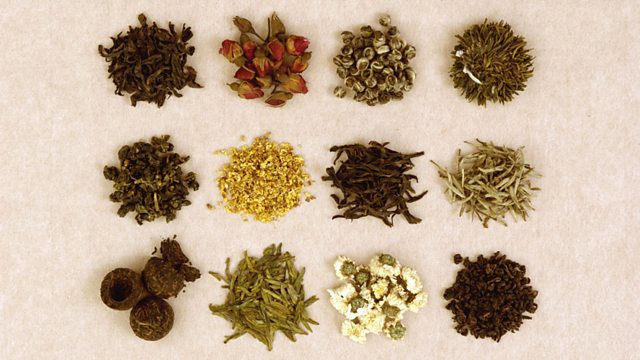Chinese Tea
Andrew Jefford visits China to explore its centuries-old tea culture. He meets tea millionaires and samples some of the finest brands in the world, including 80-year-old vintages.
China claims to have 10,000 teas. All come from the camellia sinensis plant, but from that point on the complexities proliferate.
There are 400 varieties of tea plant, 6 types of tea all processed in a different way, and seemingly infinite variations of terroir and tea-producing traditions that have gone into creating the unique and complex culture of tea in China.
To try to understand some of these complexities, Andrew Jefford joins pioneering tea importer Edward Eisler of Jing Tea, as he visited some of his suppliers in China.
They begin their journey at the very farm which produced some of the first black teas ever shipped to Britain – Bohea Farm, in the Floating Dragon Gorge of Wuyi Mountains.
Bohea is a black tea made from wild, organically grown tea bushes, and in the early days bohea was a term used to describe all black teas from China. As a black tea the leaves are withered, then allowed to oxidise before they are processed, or gently heated, with smoke from local pine logs.
This subtly smoked flavour was the precursor of the more aggressively smoky Lapsang Souchong tea, made using different base teas and using more smoke. Andrew talks to Bohea Farm President, Jiang Yuanxun about the quality difference between Lapsang Souchong and Bohea.
Andrew visits the port city of Fuzhou and meets jasmine tea producer Zhen Zhen. She talks about tea making and drinking in modern day Chinese culture.
Andrew goes to Hangzhou in China’s biggest tea-producing province Zhejiang and talks to exporter Li Haitao where they visit a tea house in the water garden of China’s national tea museum. They drink Long Jing or Dragon Well tea, one of the most famous green teas in China, and a far cry from the green tea readily available in the UK. Ed explains how this is made.
Andrew visits the city of Guangzhou (formerly Canton) and Fangsun Market where he finds out about puerh tea, a tea from Yunnan Province which usually goes through a distinctive ageing process.
The rarest puerh teas are up to 100 years old, and for a 350g cake of “red seal” puerh, produced in the 1950s, you would pay £8,000. Andrew talks to Miss Zhiang Jung of the Men Dao Puerh Tea Connoisseur’s Club, which overlooks the Pearl River in Guangzhou, and samples the rare red seal puerh.
Last on
More episodes
Previous
Next
Broadcasts
- Sun 24 Jun 2007 12:32����ý Radio 4
- Mon 25 Jun 2007 16:00����ý Radio 4
Featured in...
![]()
Tea
A collection of programmes relating to tea.
Download this programme
Subscribe to this programme or download individual episodes.
Can comfort foods really make you feel better?
Yes they can, says Sheila Dillon.
Podcast
-
![]()
The Food Programme
Investigating every aspect of the food we eat



